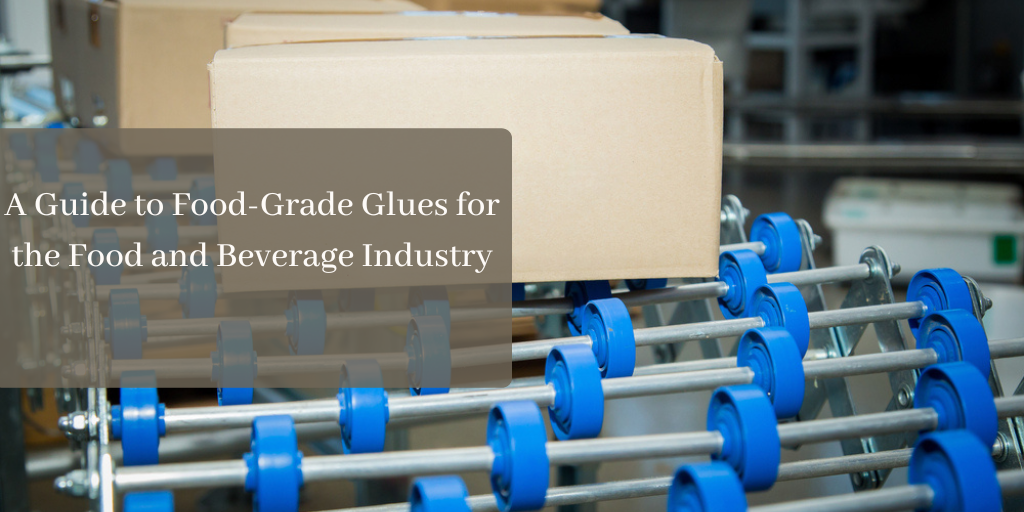For food and beverage manufacturers, safety isn’t just about the ingredient inside the package, but also the materials that hold it together. Food-grade glues play a critical role in keeping products secure, labeled, and ready for distribution. A carefully selected glue will also help minimize interruptions on the packaging line to reduce bottlenecks. These adhesives are held to strict safety standards designed to protect consumers and prevent potential health risks.
Our guide on food-grade glues will take a closer look at the FDA rules and regulations that govern their use and the importance of compliance. We will also explore some of their most common applications on the packaging line and how to choose the right food-grade glue for your particular packaging needs.
The Rules for Determining Which Glues Are Considered Food-Safe
Every food and beverage product will have packaging that involves an adhesive. The packaging could be as simple as a bar code label on a piece of produce or as complex as a multi-layered carton. By using compliant glues and following the defined guidelines, manufacturers can confirm that their packaging will not introduce harmful substances into the food, whether through direct or indirect contact.
Adhesives used in food packaging must meet strict regulatory guidelines defined by the Food and Drug Administration (FDA). These regulations require the use of approved ingredients and adherence to Good Manufacturing Practice (GMP) to ensure consumer safety from both a chemical composition and application standpoint.
Under FDA 21 CFR 175.105., only certain substances can be used in adhesive formulations, and their use is subject to specific conditions. The regulation also explains when a functional barrier is required and the rules for contact with certain food types to prevent packaging materials from migrating into food.
FDA 21 CFR 175.300
is a regulation covering resinous and polymeric coatings that come into direct contact with food. It specifies which substances may be used in these coatings and sets limits on how much of those substances can migrate into food, which must be verified through appropriate testing.
How Food Contact Will Help Determine the Right Adhesive
When choosing the right adhesive for a particular product, manufacturers should understand and consider its interaction with the food. The FDA recognizes three types of contact:
- Direct Contact: These applications require the most stringent compliance as they involve the most risk. An adhesive will have physical contact with the food product, like the glue on a fruit label or the inner lining of a container.
- Indirect Contact: We touched on this designation above, but the main idea is that the adhesive could come into contact with food, but it is separated by a functional barrier, like a polyethylene bag in a cereal box.
- Incidental Contact: Food may come into temporary contact with food processing equipment on the line during manufacturing. This often applies to glues used to secure conveyor belts or machinery parts.
As you’ll see next, some food-grade glues are better suited for direct contact applications in food and beverage packaging, while others are only FDA-compliant for indirect contact.
Finding the Right Food-Grade Glue for the Job
There are many different types of adhesives that can be formulated to be FDA-compliant for food and beverage packaging in high-speed manufacturing. Here are the types of formulations we offer at LD Davis for a wide range of applications in the food and beverage industry. In addition to the breakdowns below, you can also check out our answers to frequently asked questions about these glue types and food safety.
Hot Melt Glues
These are highly versatile, with many formulations meeting FDA requirements for both direct and indirect food contact. Metallocene hot melt adhesives are often preferred for high-speed food packaging and end-of-line applications because they deliver strong bonds, excellent pot stability, and virtually no odor. Pressure-sensitive adhesives can also be formulated for direct contact with food, such as the adhesives used on labels for fruits and vegetables.
Gelatin Glues
Gelatin glues are also referred to as protein glue and are FDA-approved for indirect food contact with dry and aqueous foods. They make a great eco-friendly choice for paper-based applications because they are non-toxic, biodegradable, and recyclable while providing a strong, relatively quick-setting bond. A common application for gelatin glues is rigid box construction, like cereal or candy boxes.
Water-based Liquid Glues
These eco-friendly, non-toxic adhesives have many formulations, including resin, dextrin, and starch glues that are approved for indirect food contact. They don’t need pre-heating and clean up easily with water. Sometimes referred to as white glues, liquid glues are often used for bottle labeling, case sealing, and manufacturing corrugated boxes.
The Advantages of Working with Adhesive Experts
Wherever you need help finding a suitable food-grade glue for your primary and secondary packaging or your end-of-line operation, the experts at LD Davis can help you select a product specifically formulated and tested for your needs. In high-speed manufacturing, you need a reliable, verifiable product that can withstand rigorous production demands and works with your packaging equipment.
We offer eco-friendly, FDA-compliant adhesives that provide a strong bond for food and beverage manufacturers who need a trusted solution. Our products support case and carton sealing, labeling, seal tray forming, and other essential applications on the line.
By partnering with a knowledgeable supplier like LD Davis, you ensure your packaging is safe, compliant, and holds up to your high-speed demands. Reach out to us today to discuss the custom requirements of your application to find the right glue for your operation.



